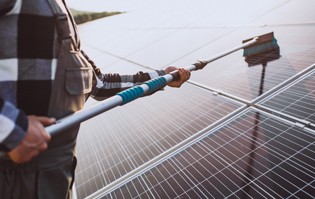Methods to Demineralize/Deionize Water for Solar Panel Cleaning Machines

After the last article "Deionized water in solar panel cleaning", we decided to go deeper into the topic.
Clean water is essential for various industrial processes, including solar panel cleaning. Demineralized or deionized water is particularly crucial for this task, as it ensures the panels remain free from mineral deposits that can impair their efficiency. In this article, we delve into the methods used to demineralize or deionize water, emphasizing their significance in maintaining the performance and longevity of solar panels, especially when paired with advanced cleaning technologies such as solar panel cleaning machines.
- Reverse Osmosis (RO) Systems: Reverse osmosis is a widely employed method for demineralizing water. It involves forcing water through a semi-permeable membrane, which separates impurities from the water molecules. RO systems effectively remove minerals, salts, and other contaminants, yielding high-purity water suitable for solar panel cleaning. These systems are relatively efficient and can be scaled to meet varying demands, making them a popular choice for industrial applications.
- Ion Exchange Resins: Ion exchange is another method used to deionize water. In this process, ion exchange resins are employed to attract and remove charged ions from the water, replacing them with hydrogen or hydroxyl ions. This results in water that is essentially free from dissolved ions, including minerals and salts. Ion exchange systems are highly effective in producing demineralized water, although they require periodic regeneration or replacement of the resin beds.
- Distillation: Distillation involves heating water to its boiling point, vaporizing it, and then condensing the steam back into liquid form. This process effectively removes impurities, as most contaminants have higher boiling points than water and are left behind during evaporation. While distillation can produce high-purity water, it is often energy-intensive and may not be as cost-effective as other methods, especially for large-scale applications like solar panel cleaning.
- Electrodialysis: Electrodialysis is a process that utilizes ion-selective membranes to separate ions from water under the influence of an electric field. Positively charged ions migrate towards the cathode, while negatively charged ions move towards the anode, effectively deionizing the water. Electrodialysis is particularly suitable for removing specific ions from water and can be tailored to target the minerals commonly found in solar panel deposits.
Integration with Solar Panel Cleaning Machines
The use of demineralized or deionized water is paramount in solar panel cleaning to prevent the buildup of mineral deposits that can diminish panel efficiency. When paired with advanced cleaning technologies such as solar panel cleaning machines, the benefits are amplified. These machines utilize various mechanisms, including brushes, sprayers, and squeegees, to efficiently remove dirt, dust, and contaminants from solar panels.
By incorporating demineralized water into the cleaning process, solar panel cleaning machines can achieve optimal results without leaving behind residues or streaks. The purity of the water ensures a spotless finish while safeguarding the integrity of the panels. Additionally, using demineralized water reduces the need for harsh detergents, minimizing environmental impact and promoting sustainability in solar panel maintenance practices.
Demineralized or deionized water plays a crucial role in solar panel cleaning, helping to maintain the efficiency and longevity of solar energy systems. Methods such as reverse osmosis, ion exchange, distillation, and electrodialysis offer effective means of producing high-purity water suitable for this purpose. When coupled with advanced cleaning technologies like solar panel cleaning machines, the benefits are maximized, ensuring optimal performance and minimal environmental impact. As the demand for clean energy continues to rise, investing in proper maintenance practices, including the use of demineralized water and advanced cleaning technologies, is essential for maximizing the efficiency and lifespan of solar panel installations.

